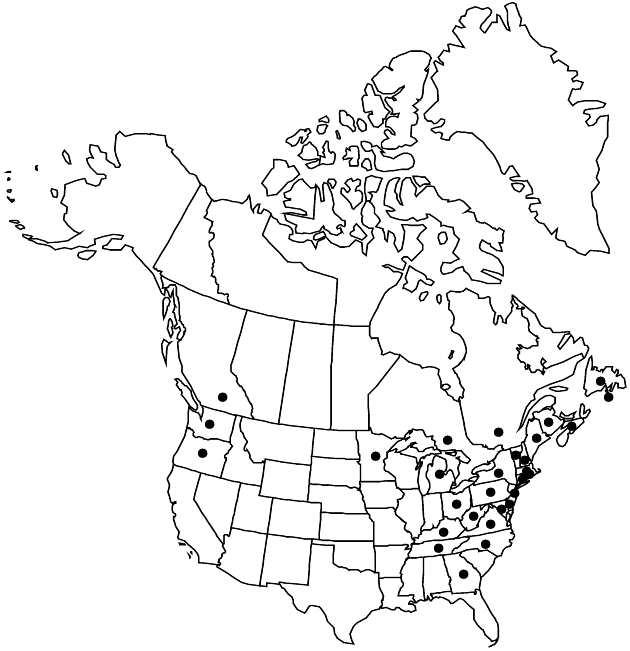Difference between revisions of "Hieracium pilosella"
Sp. Pl. 2: 800. 1753.
FNA>Volume Importer |
imported>Volume Importer |
||
| (4 intermediate revisions by 2 users not shown) | |||
| Line 8: | Line 8: | ||
}} | }} | ||
|common_names=Mouse-ear hawkweed;épervière piloselle | |common_names=Mouse-ear hawkweed;épervière piloselle | ||
| + | |special_status={{Treatment/ID/Special_status | ||
| + | |code=I | ||
| + | |label=Introduced | ||
| + | }} | ||
|basionyms= | |basionyms= | ||
|synonyms={{Treatment/ID/Synonym | |synonyms={{Treatment/ID/Synonym | ||
|name=Hieracium pilosella var. niveum | |name=Hieracium pilosella var. niveum | ||
|authority=Müller Argoviensis | |authority=Müller Argoviensis | ||
| + | |rank=variety | ||
}} {{Treatment/ID/Synonym | }} {{Treatment/ID/Synonym | ||
|name=Pilosella officinarum | |name=Pilosella officinarum | ||
| − | |authority= | + | |authority= |
| + | |rank=species | ||
}} | }} | ||
|hierarchy=Asteraceae;Asteraceae tribe Cichorieae;Hieracium;Hieracium pilosella | |hierarchy=Asteraceae;Asteraceae tribe Cichorieae;Hieracium;Hieracium pilosella | ||
| Line 30: | Line 36: | ||
|elevation=10–100+ m | |elevation=10–100+ m | ||
|distribution=St. Pierre and Miquelon;B.C.;N.B.;Nfld. and Labr. (Nfld.);N.S.;Ont.;Que.;Conn.;Del.;Ga.;Ky.;Maine;Md.;Mass.;Mich.;Minn.;N.H.;N.J.;N.Y.;N.C.;Ohio;Oreg.;Pa.;R.I.;Tenn.;Vt.;Va.;Wash.;W.Va.;Europe. | |distribution=St. Pierre and Miquelon;B.C.;N.B.;Nfld. and Labr. (Nfld.);N.S.;Ont.;Que.;Conn.;Del.;Ga.;Ky.;Maine;Md.;Mass.;Mich.;Minn.;N.H.;N.J.;N.Y.;N.C.;Ohio;Oreg.;Pa.;R.I.;Tenn.;Vt.;Va.;Wash.;W.Va.;Europe. | ||
| + | |introduced=true | ||
|tables= | |tables= | ||
|references= | |references= | ||
| Line 38: | Line 45: | ||
-->{{#Taxon: | -->{{#Taxon: | ||
name=Hieracium pilosella | name=Hieracium pilosella | ||
| − | |||
|authority=Linnaeus | |authority=Linnaeus | ||
|rank=species | |rank=species | ||
| Line 53: | Line 59: | ||
|publication title=Sp. Pl. | |publication title=Sp. Pl. | ||
|publication year=1753 | |publication year=1753 | ||
| − | |special status= | + | |special status=Introduced |
| − | |source xml=https:// | + | |source xml=https://bitbucket.org/aafc-mbb/fna-data-curation/src/2e0870ddd59836b60bcf96646a41e87ea5a5943a/coarse_grained_fna_xml/V19-20-21/V19_388.xml |
|tribe=Asteraceae tribe Cichorieae | |tribe=Asteraceae tribe Cichorieae | ||
|genus=Hieracium | |genus=Hieracium | ||
Latest revision as of 19:51, 5 November 2020
Plants 10–25(–40+) cm. Stems proximally piloso-hirsute (hairs 1–3+ mm) and stellate-pubescent, distally piloso-hirsute (hairs 1–2 mm), stellate-pubescent, and stipitate-glandular. Leaves: basal (2–)5–10+, cauline 0(–3); blades elliptic to ± oblanceolate, 10–45(–75+) × 5–12(–18+) mm, lengths 2–4(–6+) times widths, bases cuneate, margins entire, apices acute, faces piloso-hirsute (hairs 2–7+ mm) and stellate-pubescent. Heads usually borne singly, rarely 2(–3). Peduncles piloso-hirsute and stellate-pubescent. Calyculi: bractlets 8–15+. Involucres hemispheric to obconic, 7.5–9 mm. Phyllaries 20–34+, apices acuminate, abaxial faces stellate-pubescent and stipitate-glandular, sometimes piloso-hirsute as well. Florets 60–120+; corollas yellow (often each with abaxial red stripe), 8–13+ mm. Cypselae columnar, 1.5–2 mm; pappi of 30+, white bristles in 1 series, 4–5 mm.
Phenology: Flowering May–Aug.
Habitat: Disturbed sites (sandy or gravelly soils, fields, lawns, roadsides)
Elevation: 10–100+ m
Distribution

Introduced; St. Pierre and Miquelon, B.C., N.B., Nfld. and Labr. (Nfld.), N.S., Ont., Que., Conn., Del., Ga., Ky., Maine, Md., Mass., Mich., Minn., N.H., N.J., N.Y., N.C., Ohio, Oreg., Pa., R.I., Tenn., Vt., Va., Wash., W.Va., Europe.
Discussion
Selected References
None.